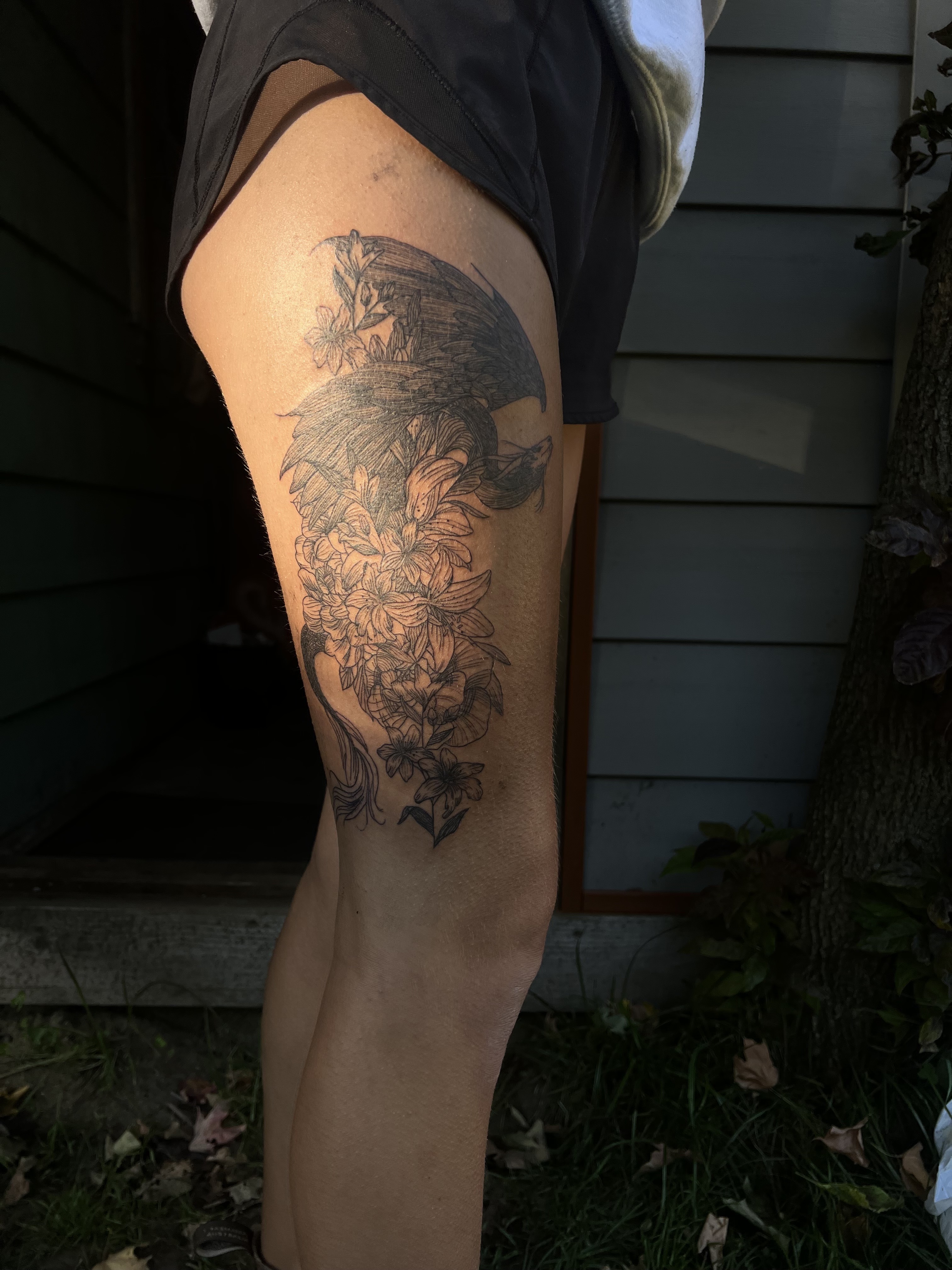Interview with Oonagh Moon - By Spencer Jean Allder
February 20, 2023
Oonagh Moon, an autistic, lesbian tattooer currently working at Studio l’Arrosoir and Grey Market Montreal, is an emerging artist and activist. Employing a linear, etched style, their work centres 2SLGBTQIA+ beauty, occult spirituality, and sexy mythical creatures. Committed to providing a “safe space for all bodies,” Oonagh is only a small part of the queer, trans, and fem inclusion revolution of the modern tattoo industry.
In this interview, Oonagh discusses art as a form of queer self expression, how the colonialist view of tattoos in Western society is rooted in racism, and their dedication to celebrating the ceremonious nature of tattoos within cultures around the world.
![]()
![]()
![]()
Q: What jump-started your passion for art, and why did you gravitate towards the tattoo industry?
A: Well, I grew up around art. Both of my parents are “hippie artists,” I guess you could say, so in my home there was always the space for freedom of self and freedom of expression. I was able to explore art from a young age and of course developed an adoration for expressing myself through art. I’ve always loved to draw, and I also really enjoy pyrography (wood burning) and painting. Tattooing seemed like a natural progression in my career as an artist, and I fell in love with the permanence of tattoos. As I’ve grown and developed into my own queerness and gender exploration, my art also developed into an expression of that queerness—a celebration of it. When I tattoo my designs, it’s like I’m permanently branding the world with the reality of queer beauty with every piece that I do. And in that way, I’m permanently changing the world bit by bit.
Q: Tattooing, similarly to brain surgery, is one job in which there is no room for mistakes. What are some strategies you use to keep a steady hand under all that pressure?
A: Yeah, I don’t know if it’s as high stakes as brain surgery, but yeah, it can be daunting for sure. Because if you fuck up it’s not like you can erase it, that’s someone else’s body. There are always tricks you can use: pull the line towards you, hold your breath, eat before you tattoo, and have a decent quality tattoo machine, but learn on a shitty one. But the reality is that you always have to leave room for error, as a client. When you're getting a tattoo, you sign up for the humanity that comes with receiving a tattoo. You're receiving their art, a little part of who they are, and their humanity. And as the artist, as much as there is no room to make a mistake, there also has to be room for self compassion because you’re imbuing your art into someone’s skin and that in itself is a gift. People know that they aren't being tattooed by a robot.
Q: Why do you think it’s important to specify on your Instagram, advertisements, and business cards that you are queer and trans?
A: I want to attract queer and trans clientele. To be frank, I don’t wanna spend hours of time in the company of cishet men. Men don’t really seek me out when my Instagram bio reads “dyke for abolition.” It’s safer for me to have clients that I know won’t mistreat me once they meet me. But on a more serious note, the industry has historically been a hyper-masculine cesspool of machismo bullshit. There’s this idea that you need to “suffer for the art” to get your foot in the door in this industry, and that was true for a long time because the people who dominated the industry were angry cishet men with mommy issues. By specifying my values, it gives people with similar or other marginalised identities the space to feel comfortable and safe. The most important thing as an artist is that the people who come to me feel respected and heard, always. It’s crucial that people with marginalised identities, or accessibility needs, are free to be authentically who they are, because I am always authentically who I am. I want to create art that makes people feel fundamentally loved.
![]()
![]()
Q: The first evidence of tattoos originates in Japan in 5000 BCE (1). Throughout Sub-Saharan Africa, tribal groups such as the Fulani are tattooed on their bodies and faces with symbols and charms to aid fertility, beauty, and health (2). Indigenous Polynesian people of what is now called New Zealand, the Māori, view tattoos as a language, a symbol of power, and a mark of honour. They also hold a sacred importance as they are thought to possess magical abilities inherited from God (3). Are there ways in which you, as a white tattoo artist in 2023, can actively recognize the spiritual and religious significance that tattooing has within so many cultures that are not your own?
A: Of course there is. All tattoo artists should be asking themselves that question every day. And not just asking, but doing the work and putting it into practice. Anti-racism should be a foundational value upon which a tattoo artist’s career sits. It’s a foundational value that my career rests on, which exists in stark contrast to the hyper-masculine, racist industry that we are seeing more and more people free themselves from. I think practical work is important: do some research, pick up a book, ask questions, seek out knowledge keepers, and learn with intention and with love. I also think that spiritual work is just as important. You need to maintain the roots of self expression, connection, and community in your own life and practice, while also holding the cultural, religious, and spiritual practices of the groups of people close to your heart.
I do not believe that there can be appreciation without love. I once read a quote by Alicia Elliot, a Tuscarora author who wrote an essay on appropriation vs. appreciation, entitled “On Seeing and Being Seen: The Difference Between Writing With Empathy and Writing With Love” (4). They discussed how one can’t write from the viewpoint of another group of people, but one most certainly can’t if one is not writing from a place of love. I think the same can be said for tattooing. If you cannot hold the deeply-rooted cultural history of tattoos with love and admiration, then you shouldn’t be tattooing. I also know that, as a white artist, I am given many more opportunities to grow and expand than Black, Indigenous, and other racialized artists. In the spirit of that, I strongly suggest that the next artist that Yiara writes about should be an artist of colour.
![]()
![]()
Q: What is your response to those who find tattoos to be considered unprofessional, or taboo? Why do you think tattoos are so heavily associated with criminal activity in Western society?
A: As you mentioned, tattoos are a staple of the cultures of people of colour. They’re criminalized for the same reason that weed was criminalized: in order to further stigmatize and oppress Black, Indigenous, and other racialized communities. The very idea that certain physical attributes make you a better or worse person is an inherently Western colonialist view. It’s just racism. So many civilizations over the course of history have used tattoos to elevate the spirit, understand one’s community, one’s identity.
There was a time, very recently, when tattoos were incredibly taboo, but tattoos these days have become symbols of identification, safety, community, and expression. To those who criticise tattoos as being unprofessional, I would recommend they do anti-racist work, and take a second to realize that they don’t have to regurgitate everything that their parents taught them. A lack of understanding, in the age of technology and the internet, is just self inflicted stupidity.
Q: What would be your dream tattoo to design for someone?
A: My dream tattoo scenario… Somebody comes in to where I work and says they want their entire back covered but don’t care what it is. They have some sort of idea of what the vibe or theme is, but otherwise I have the full creative freedom to make a detailed back piece that is a full reflection of my work and the intention of the client.
Honestly, I don't dream about what specific tattoo I get to do next because every custom design, flash piece, and new idea sparks something so specific inside me and I get so excited. Each one is better than the last and each idea brings me more joy than the last one. It’s a privilege to get to design them all. I’m constantly being inspired by my client base, even more so as it grows steadily here in Montreal.
Follow Oonagh Moon on Instagram: @rowboattattoos
In this interview, Oonagh discusses art as a form of queer self expression, how the colonialist view of tattoos in Western society is rooted in racism, and their dedication to celebrating the ceremonious nature of tattoos within cultures around the world.
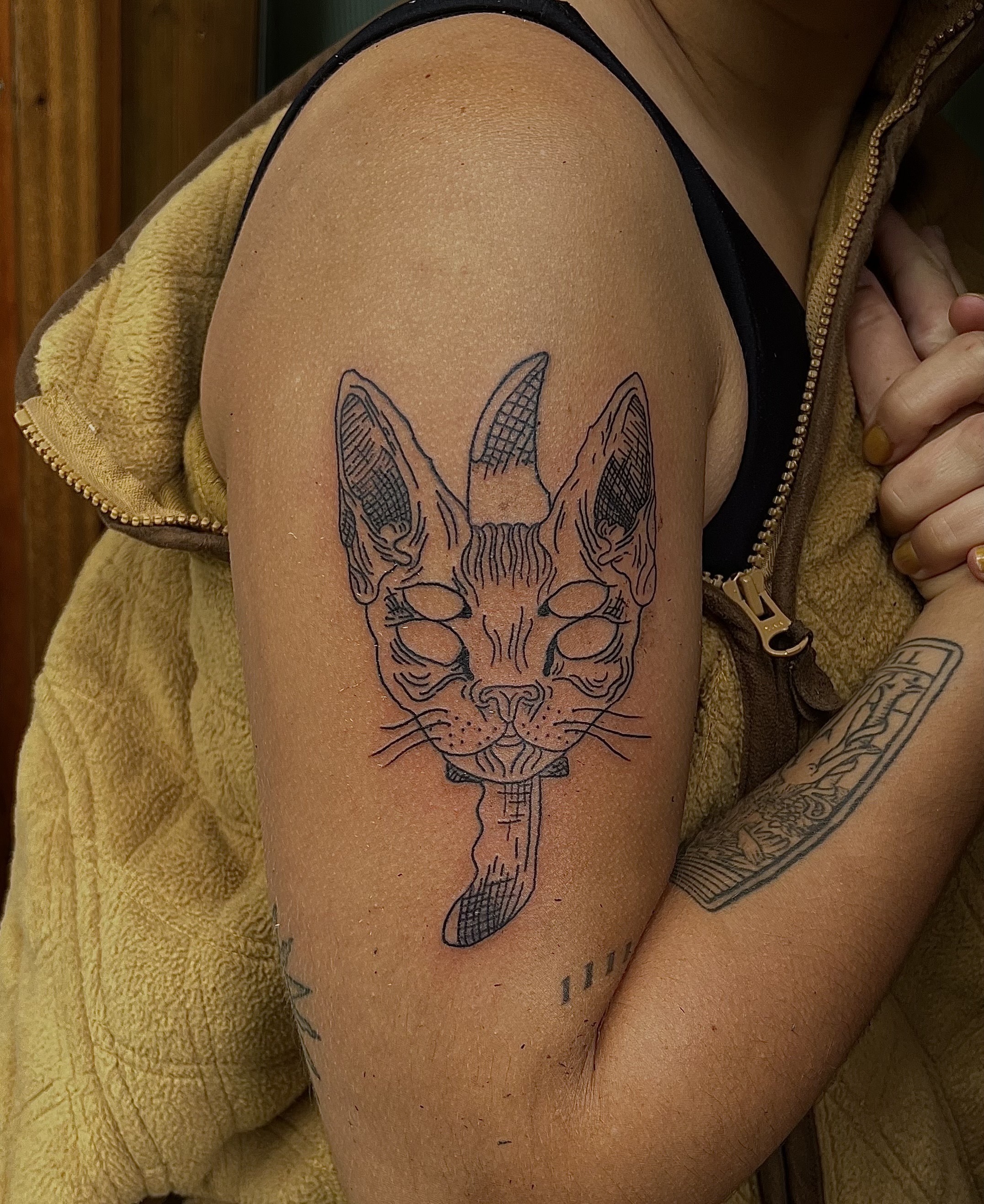
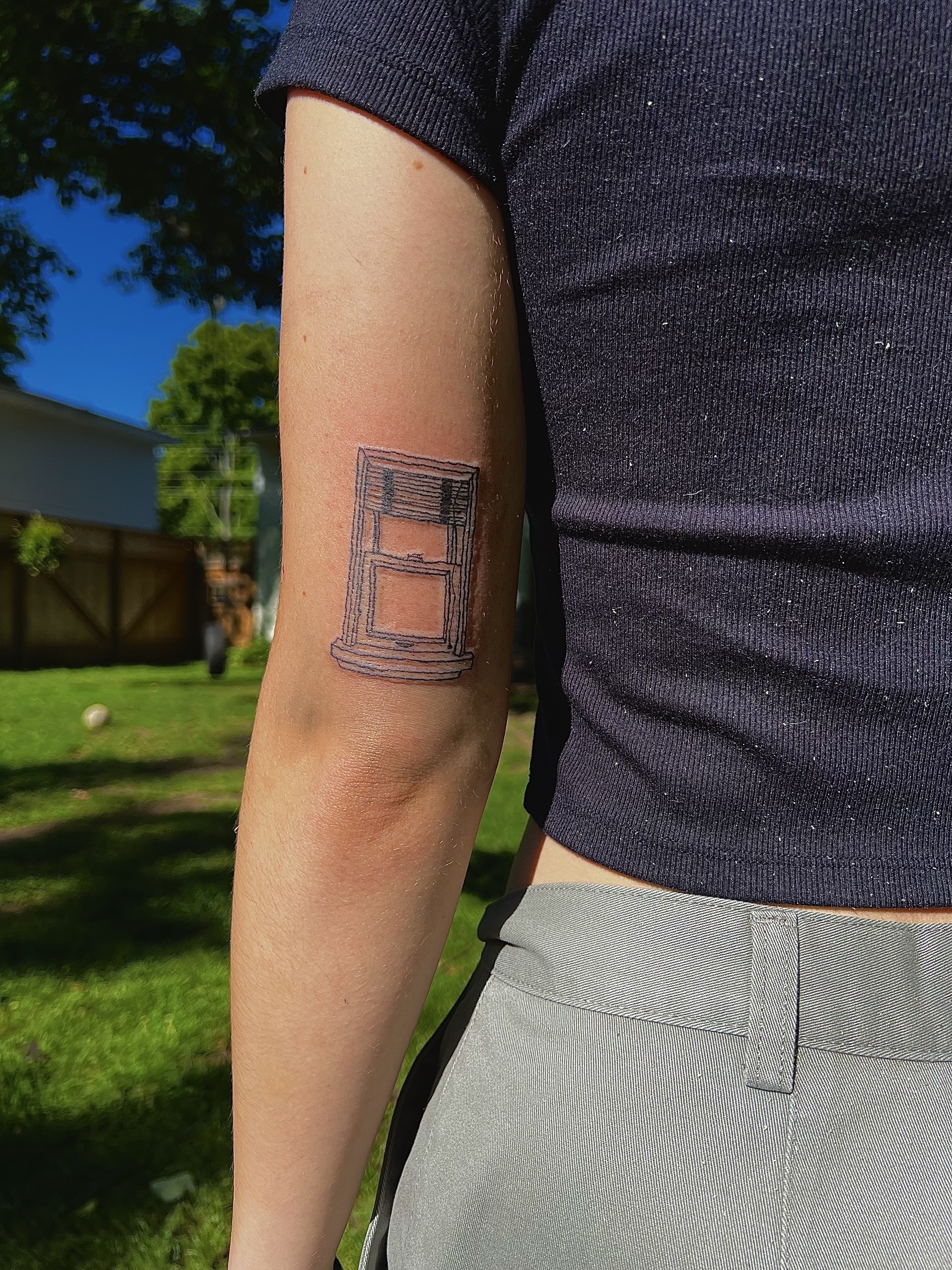
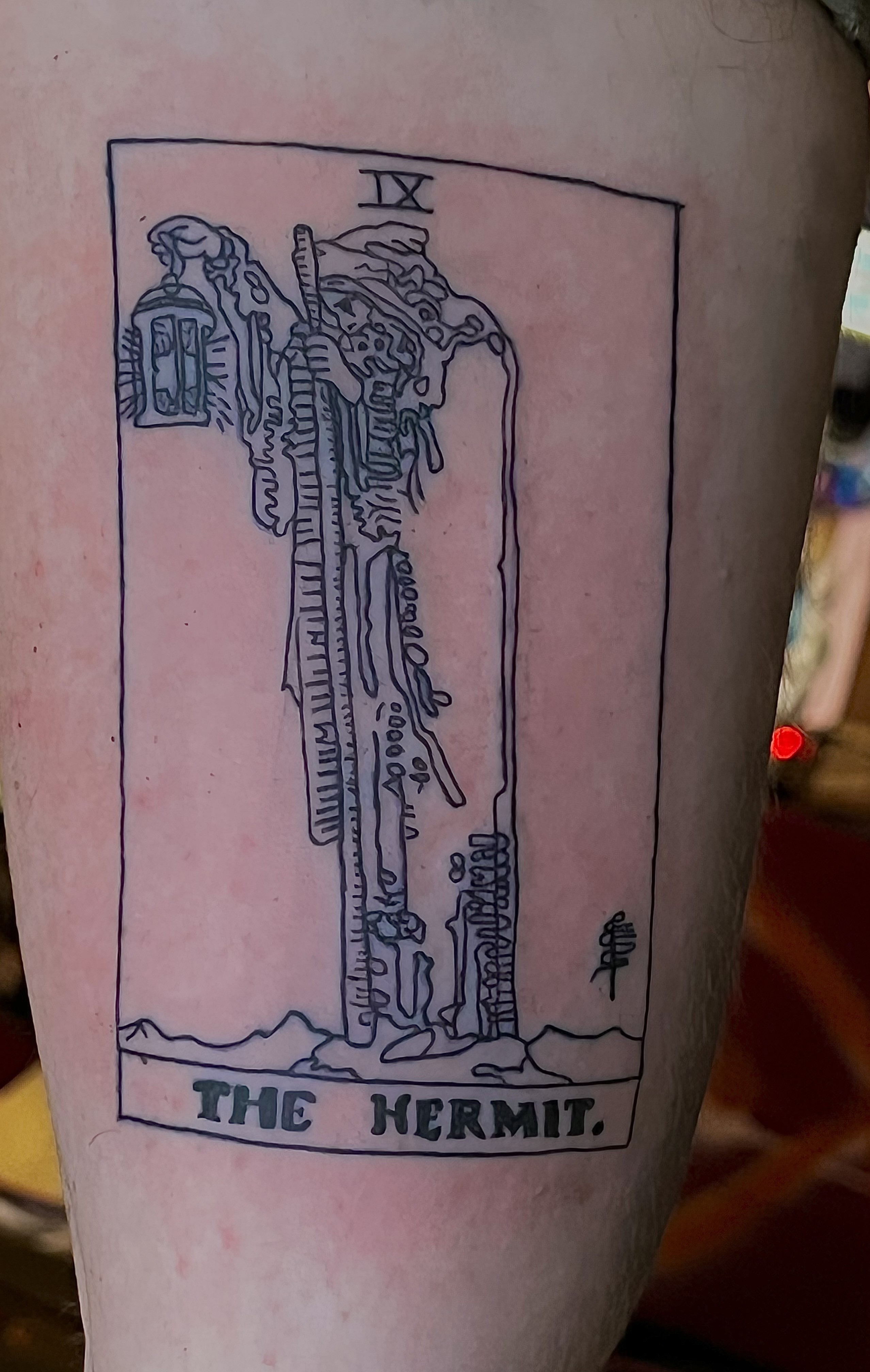
Q: What jump-started your passion for art, and why did you gravitate towards the tattoo industry?
A: Well, I grew up around art. Both of my parents are “hippie artists,” I guess you could say, so in my home there was always the space for freedom of self and freedom of expression. I was able to explore art from a young age and of course developed an adoration for expressing myself through art. I’ve always loved to draw, and I also really enjoy pyrography (wood burning) and painting. Tattooing seemed like a natural progression in my career as an artist, and I fell in love with the permanence of tattoos. As I’ve grown and developed into my own queerness and gender exploration, my art also developed into an expression of that queerness—a celebration of it. When I tattoo my designs, it’s like I’m permanently branding the world with the reality of queer beauty with every piece that I do. And in that way, I’m permanently changing the world bit by bit.
“The most important thing as an artist is that the people who come to me feel respected and heard, always.”
![]()
![]()
Q: Tattooing, similarly to brain surgery, is one job in which there is no room for mistakes. What are some strategies you use to keep a steady hand under all that pressure?
A: Yeah, I don’t know if it’s as high stakes as brain surgery, but yeah, it can be daunting for sure. Because if you fuck up it’s not like you can erase it, that’s someone else’s body. There are always tricks you can use: pull the line towards you, hold your breath, eat before you tattoo, and have a decent quality tattoo machine, but learn on a shitty one. But the reality is that you always have to leave room for error, as a client. When you're getting a tattoo, you sign up for the humanity that comes with receiving a tattoo. You're receiving their art, a little part of who they are, and their humanity. And as the artist, as much as there is no room to make a mistake, there also has to be room for self compassion because you’re imbuing your art into someone’s skin and that in itself is a gift. People know that they aren't being tattooed by a robot.
Q: Why do you think it’s important to specify on your Instagram, advertisements, and business cards that you are queer and trans?
A: I want to attract queer and trans clientele. To be frank, I don’t wanna spend hours of time in the company of cishet men. Men don’t really seek me out when my Instagram bio reads “dyke for abolition.” It’s safer for me to have clients that I know won’t mistreat me once they meet me. But on a more serious note, the industry has historically been a hyper-masculine cesspool of machismo bullshit. There’s this idea that you need to “suffer for the art” to get your foot in the door in this industry, and that was true for a long time because the people who dominated the industry were angry cishet men with mommy issues. By specifying my values, it gives people with similar or other marginalised identities the space to feel comfortable and safe. The most important thing as an artist is that the people who come to me feel respected and heard, always. It’s crucial that people with marginalised identities, or accessibility needs, are free to be authentically who they are, because I am always authentically who I am. I want to create art that makes people feel fundamentally loved.
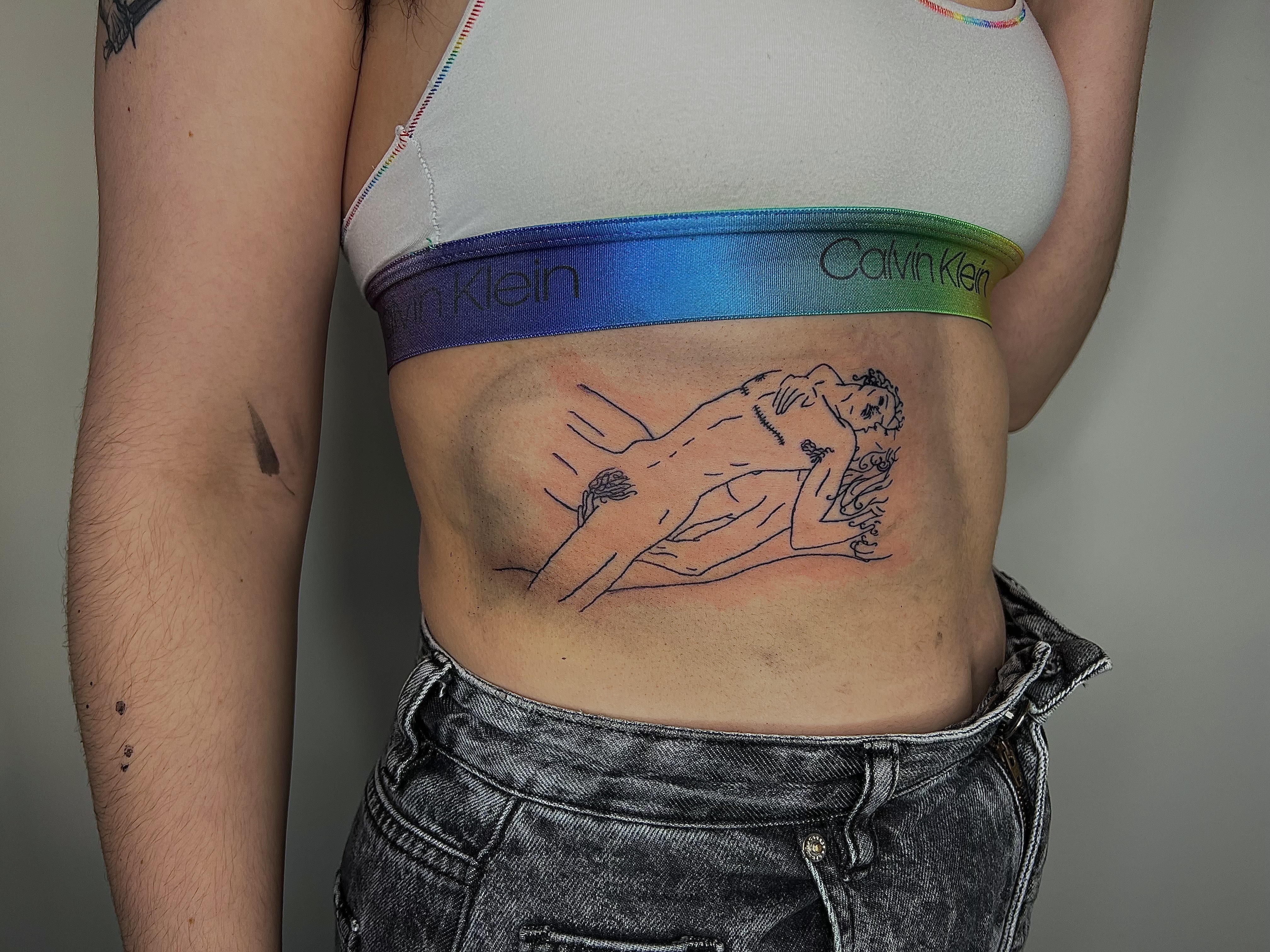
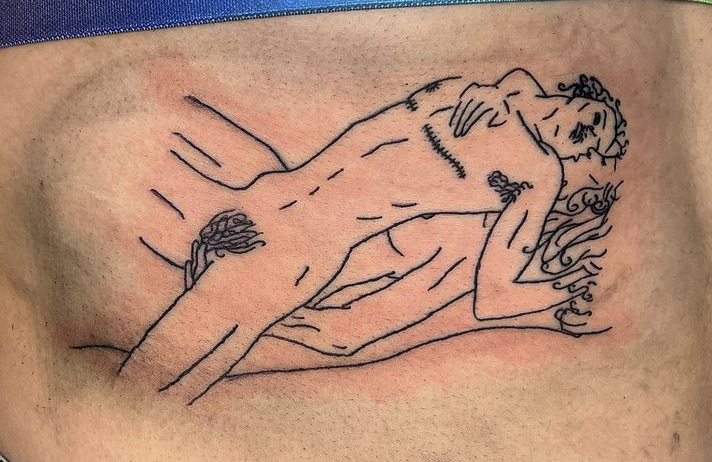
Q: The first evidence of tattoos originates in Japan in 5000 BCE (1). Throughout Sub-Saharan Africa, tribal groups such as the Fulani are tattooed on their bodies and faces with symbols and charms to aid fertility, beauty, and health (2). Indigenous Polynesian people of what is now called New Zealand, the Māori, view tattoos as a language, a symbol of power, and a mark of honour. They also hold a sacred importance as they are thought to possess magical abilities inherited from God (3). Are there ways in which you, as a white tattoo artist in 2023, can actively recognize the spiritual and religious significance that tattooing has within so many cultures that are not your own?
A: Of course there is. All tattoo artists should be asking themselves that question every day. And not just asking, but doing the work and putting it into practice. Anti-racism should be a foundational value upon which a tattoo artist’s career sits. It’s a foundational value that my career rests on, which exists in stark contrast to the hyper-masculine, racist industry that we are seeing more and more people free themselves from. I think practical work is important: do some research, pick up a book, ask questions, seek out knowledge keepers, and learn with intention and with love. I also think that spiritual work is just as important. You need to maintain the roots of self expression, connection, and community in your own life and practice, while also holding the cultural, religious, and spiritual practices of the groups of people close to your heart.
I do not believe that there can be appreciation without love. I once read a quote by Alicia Elliot, a Tuscarora author who wrote an essay on appropriation vs. appreciation, entitled “On Seeing and Being Seen: The Difference Between Writing With Empathy and Writing With Love” (4). They discussed how one can’t write from the viewpoint of another group of people, but one most certainly can’t if one is not writing from a place of love. I think the same can be said for tattooing. If you cannot hold the deeply-rooted cultural history of tattoos with love and admiration, then you shouldn’t be tattooing. I also know that, as a white artist, I am given many more opportunities to grow and expand than Black, Indigenous, and other racialized artists. In the spirit of that, I strongly suggest that the next artist that Yiara writes about should be an artist of colour.
“A rapist can get a job as the president but a bitch with tattoos can’t get a job at the bank? Okay.”
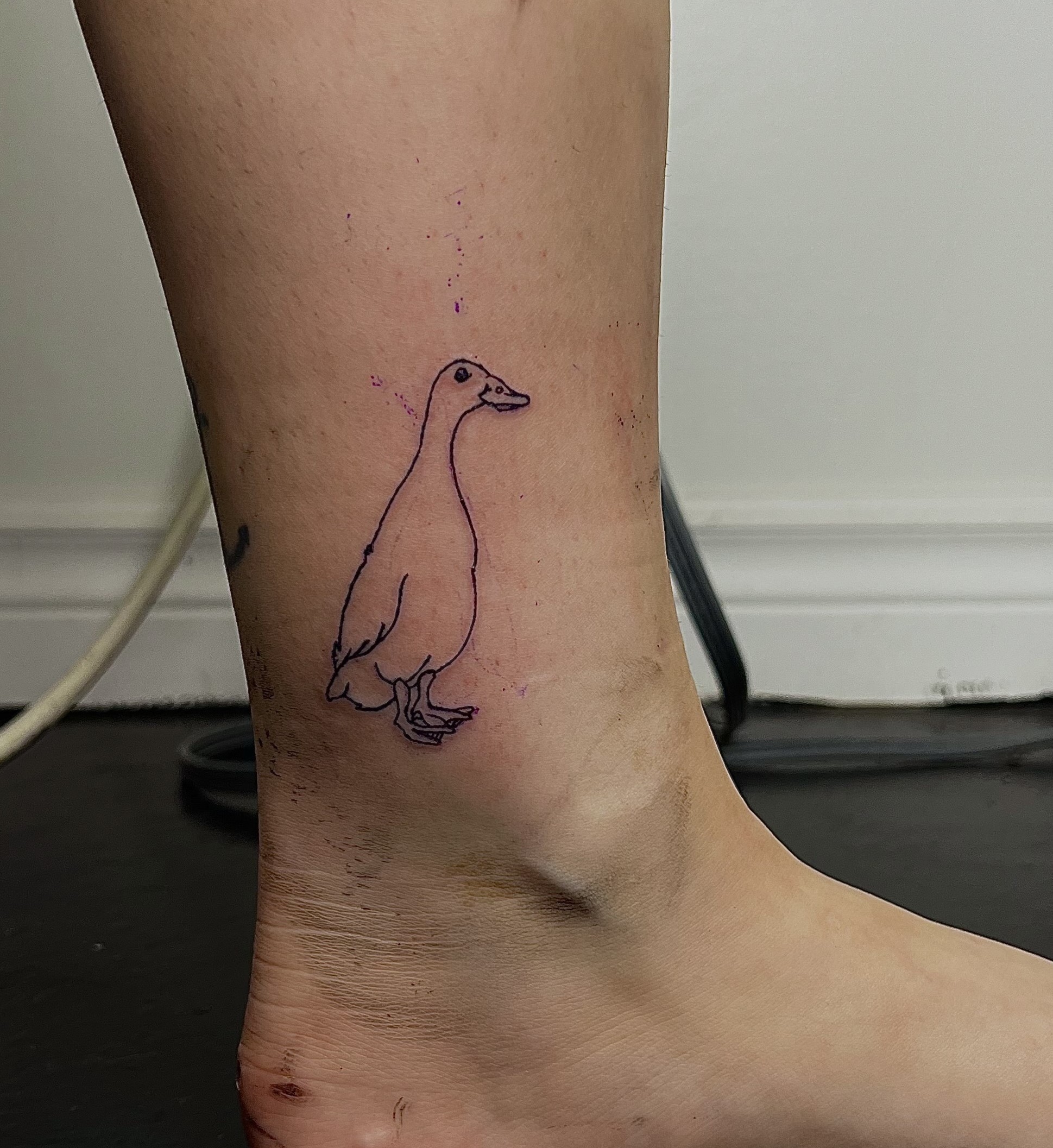
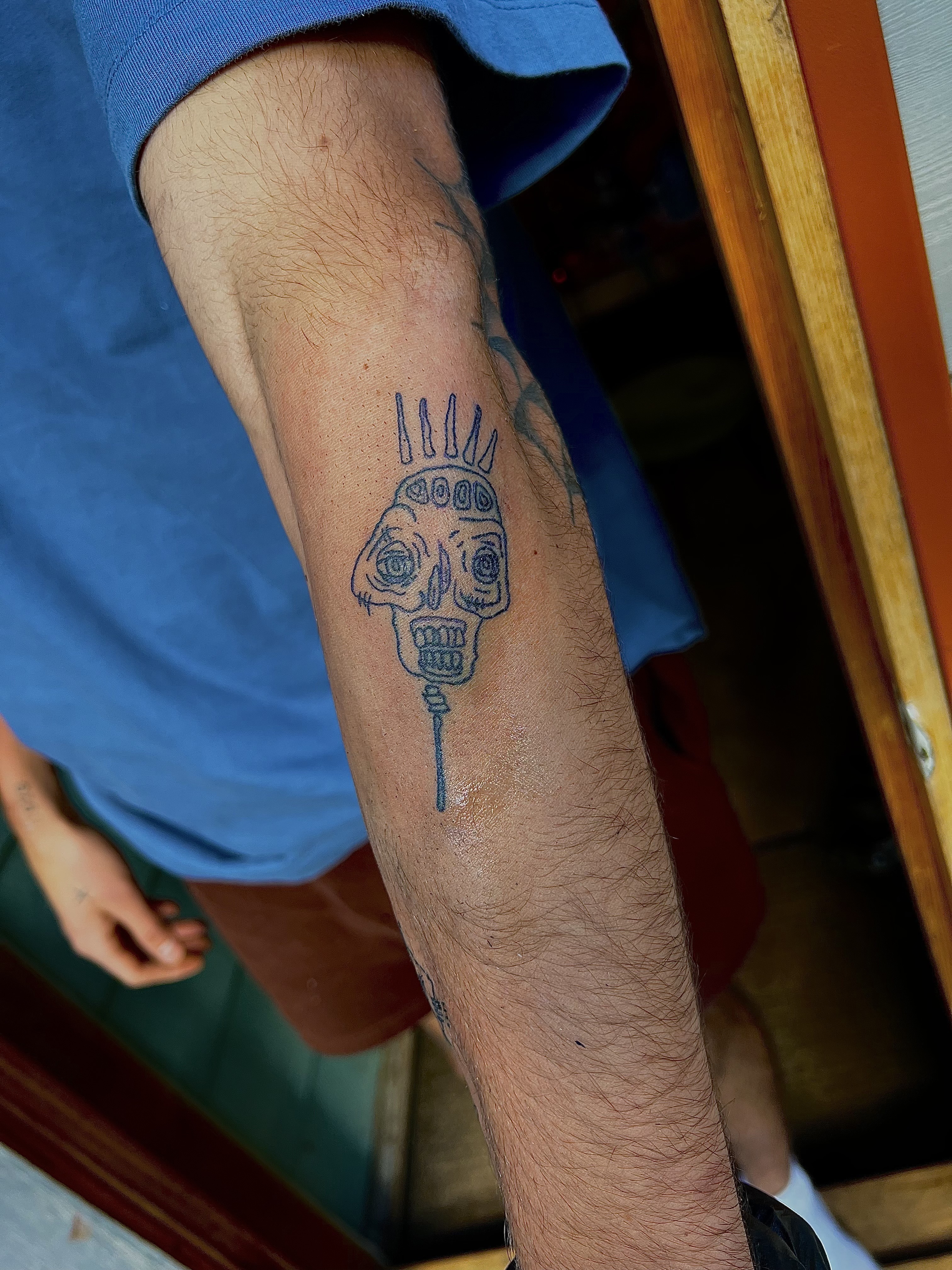
Q: What is your response to those who find tattoos to be considered unprofessional, or taboo? Why do you think tattoos are so heavily associated with criminal activity in Western society?
A: As you mentioned, tattoos are a staple of the cultures of people of colour. They’re criminalized for the same reason that weed was criminalized: in order to further stigmatize and oppress Black, Indigenous, and other racialized communities. The very idea that certain physical attributes make you a better or worse person is an inherently Western colonialist view. It’s just racism. So many civilizations over the course of history have used tattoos to elevate the spirit, understand one’s community, one’s identity.
There was a time, very recently, when tattoos were incredibly taboo, but tattoos these days have become symbols of identification, safety, community, and expression. To those who criticise tattoos as being unprofessional, I would recommend they do anti-racist work, and take a second to realize that they don’t have to regurgitate everything that their parents taught them. A lack of understanding, in the age of technology and the internet, is just self inflicted stupidity.
Q: What would be your dream tattoo to design for someone?
A: My dream tattoo scenario… Somebody comes in to where I work and says they want their entire back covered but don’t care what it is. They have some sort of idea of what the vibe or theme is, but otherwise I have the full creative freedom to make a detailed back piece that is a full reflection of my work and the intention of the client.
Honestly, I don't dream about what specific tattoo I get to do next because every custom design, flash piece, and new idea sparks something so specific inside me and I get so excited. Each one is better than the last and each idea brings me more joy than the last one. It’s a privilege to get to design them all. I’m constantly being inspired by my client base, even more so as it grows steadily here in Montreal.
Follow Oonagh Moon on Instagram: @rowboattattoos
References
- New Zealand Ministry for Culture and Heritage Te Manatu Taonga. (2020, March 31). Māori. Te Ara Encyclopedia of New Zealand – Te Ara Encyclopedia of New Zealand. Retrieved February 6, 2023, from https://teara.govt.nz/en/maori#:~:text=The%20ancestors%20of%20M%C4%81ori%20arrived,and%20strong%20traditions%20of%20warfare.
- Olson, A. (2010, April 12). A brief history of tattoos. Wellcome Collection. Retrieved February 6, 2023, from https://wellcomecollection.org/articles/W9m2QxcAAF8AFvE5
- Tattoos of SUB-SAHARAN africa: Lars Krutak. Lars Krutak | Tattoo Anthropologist. (2022, May 19). Retrieved February 6, 2023, from https://www.larskrutak.com/tattoos-of-sub-saharan-africa/
- Elliot, A. (2011). “On Seeing and Being Seen: The Difference Between Writing With Empathy and Writing With Love.” Retrieved 2023, from https://roommagazine.com/on-seeing-and-being-seen-the-difference-between-writing-with-empathy-and-writing-with-love/
